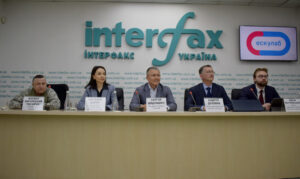
The Eskulab laboratory chain is fulfilling its obligations, but the conflict between the owners has jeopardized the network’s development plans, said Natalia Kohut, Eskulab’s medical director.
“We fulfill 100% of the obligations we undertook in 2024 in terms of conducting trials. But the issue of interaction between the co-founders of the company, unfortunately, has suspended the dynamic growth of the network,” she said at a press conference at Interfax-Ukraine on Tuesday.
Kohut said that the company planned to open 25 branches in Kyiv and Lviv region in 2024 and start expanding to the central and eastern regions of Ukraine.
“We did have such opportunities. We have already opened three laboratories outside of Lviv and Kyiv, but unfortunately, we do not have this opportunity now,” she said.
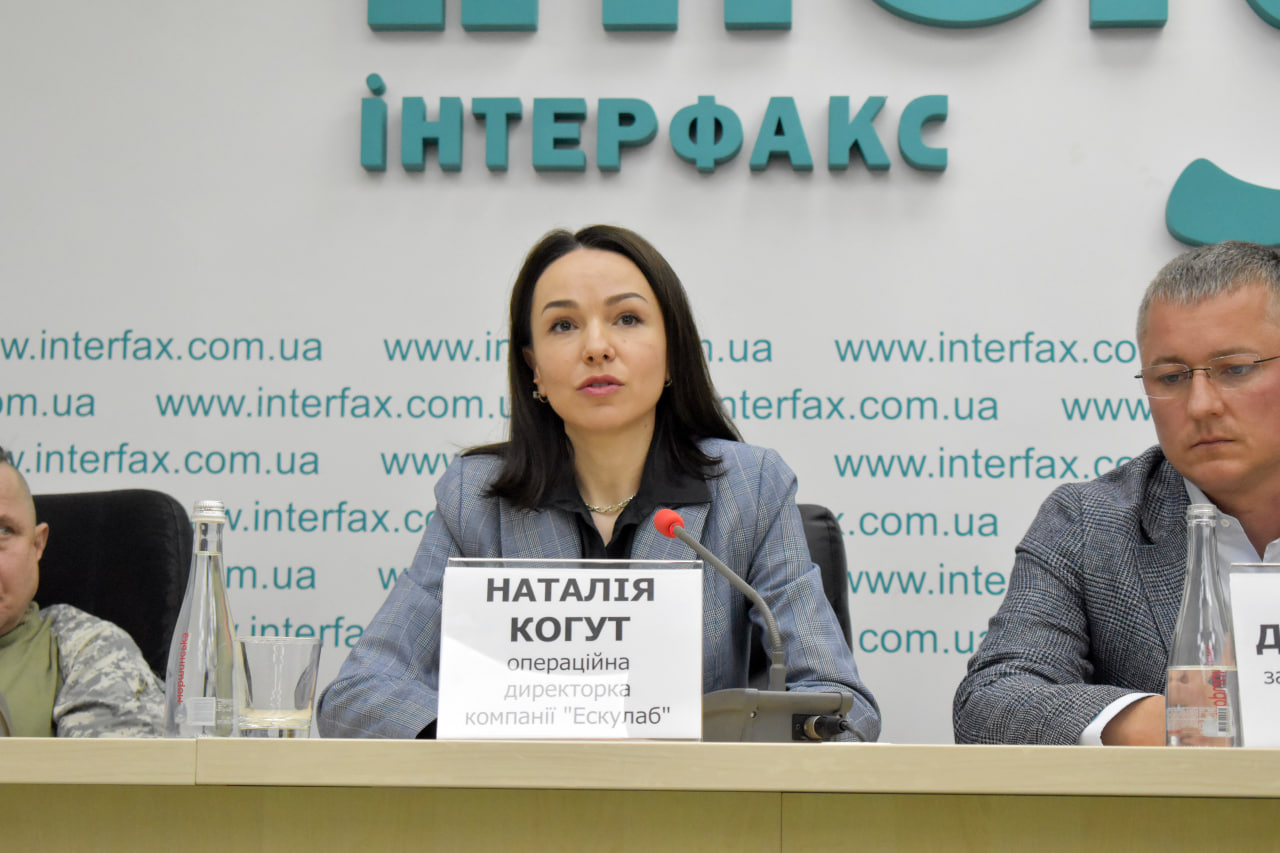
Natalia Kohut also noted that since the beginning of the full-scale invasion, the network has been accredited for the quality of its management system. At the same time, Eskulab provides laboratory services to more than 5,000 patients every day.
“We are conducting honest business activities, we have no financial abuses in relation to the obligations we have assumed,” she said.
For his part, Andriy Dubivka, CFO of Eskulab, noted that the possible losses of the network due to the conflict between the co-founders could be estimated at hundreds of millions of hryvnias, if not a billion.
“We are currently calculating the losses. We pay official dividends according to the reporting forms. We have set ourselves the task of making the company transparent and clean,” he said.
Andriy Dubivka clarified that at the meeting held last week, the co-founders of Eskulab did not agree on the formation of the company’s governing body, so the Management Board established by the decision of the meeting in October 2023 remains the legitimate body.

“At the meeting, the participants did not reach any agreement, as Sergiy Dyadyushko’s position was clear: the said management board is able to continue to fulfill its powers,” he said.
For his part, co-founder of the Eskulab network Serhiy Dyadyushko noted that the conflict between the co-founders arose in 2023, when co-founders Stanislav Lugovskyi and Denys Melnyk attempted to re-register Serhiy Dyadyushko’s share and remove him from the network. In addition, according to Serhiy Dyadyushko, his business partners did not support the activities of the charitable foundation Aesculab, which he had created, which, among other things, provides food, medicines and medical devices to the military.
“According to the version of the company’s charter adopted in October 2023, each of the company’s participants has a representative in the board, so there is one representative on my side and two on the side of my opponents,” he said.
As reported earlier, the Eskulab Group, which operates the Eskulab medical laboratory network (PE First Social Medical Laboratory (FSML) Eskulab and Eskulab Center LLC), announced the risks of stopping the network’s operation due to raider seizure attempts by its two co-founders Stanislav Luhovskyi and Denys Melnyk, who carried out a raider seizure and blocked Eskulab’s financial operations through their representatives in the management. In this regard, Diadiushko appealed to law enforcement agencies.
In his turn, Denys Melnyk said in a comment to Interfax-Ukraine that he and Stanislav Luhovskyi “are being removed from any management or influence on the company,” their access to their jobs has been blocked for several months, and Diadiushko “deliberately conceals the state of affairs in the financial and economic part.”
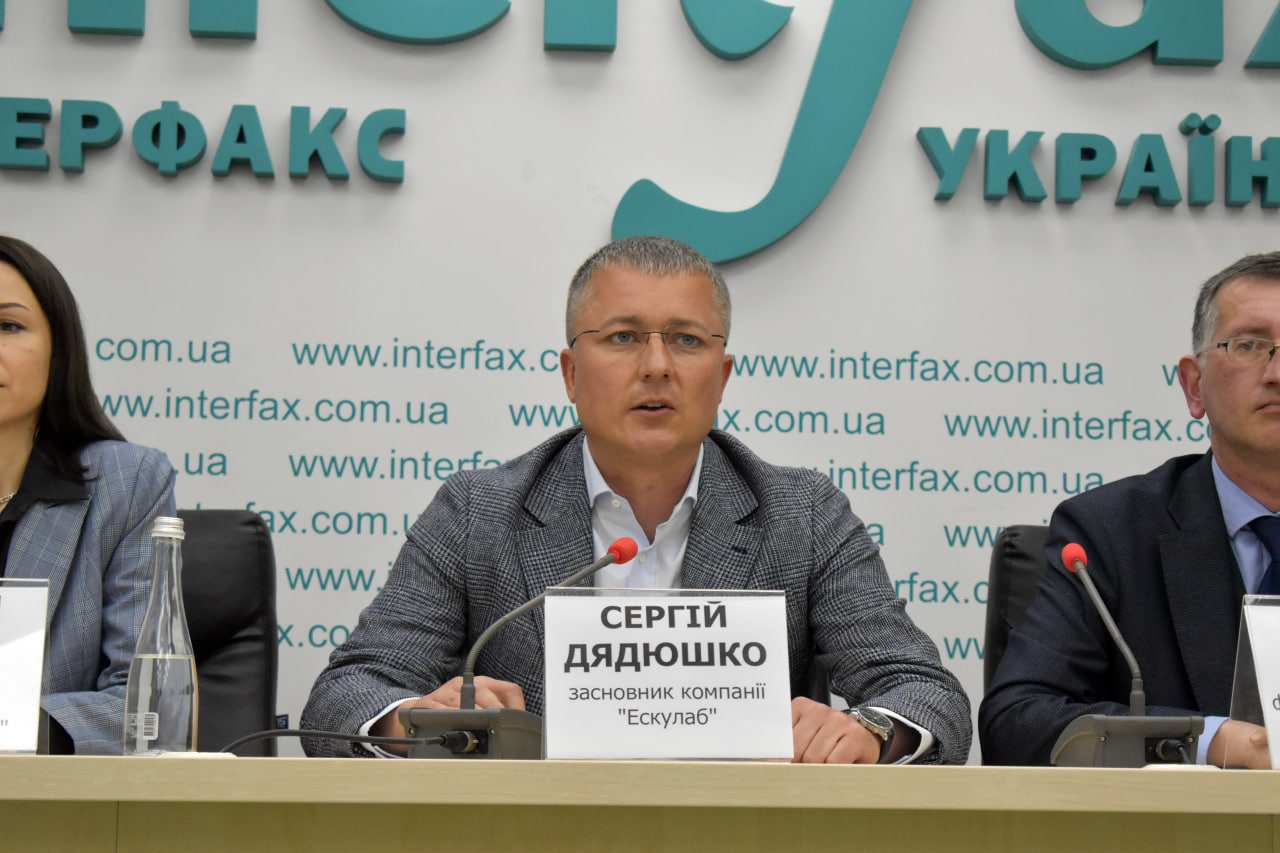
At the same time, Dyadyushko’s representative, lawyer Yuriy Petrovsky, said that the company’s shareholders are not deprived of the right to manage the company, as confirmed by the general meeting of the company’s shareholders convened by Lugovsky on April 12. At the same time, according to Melnyk, another meeting of Aesculab’s shareholders is scheduled for April 19, 2024.
He said, “as for the operational management of the company’s production processes, two participants carry out such management through their delegated representatives of the management: commercial director Roman Vysotsky and financial director Andriy Dubivka. Currently, it is Vysotskyi who is blocking the company’s operational activities.”…
Eskulab Medical Laboratory is one of the three largest private laboratories in Ukraine, contracted by the National Health Service of Ukraine (NHSU). The network consists of five laboratory centers and 180 sample collection points in the western regions of Ukraine and Kyiv.
In 2023, Eskulab paid UAH 33.8 million in taxes, including UAH 14.97 million in unified social tax, UAH 1.33 million in military duty, and UAH 14.034 million in personal income tax. It is one of the ten largest taxpayers in Lviv region.
The co-founders of PE “PSML “Eskulab” are Dyadyushko, who owns 43% of the company, Luhovskyi (43%) and Melnyk (14%). The co-founders of Eskulab Center LLC are Dyadyushko, Luhovskyi and Melnyk, who each own 20% of the company, and Ruslana Soltani, who owns 40%.
Aesculab, CONFLICT, Kohut, Petrovsky, RAIDING, Дубівка, Дядюшко
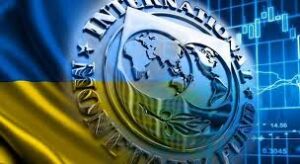
The International Monetary Fund (IMF) has clarified the forecast of Ukraine’s GDP growth in 2024 under the World Economic Outlook (WEO): it expects it at the level of 3.2%, then during the third revision of the EFF Extended Fund Facility program in March estimated it in the range of 3-4%.
According to a publication on the Fund’s website on Tuesday, the economic growth forecast for 2025 was kept at 6.5%, up from 5.3% in 2023, according to the State Statistics Service.
The IMF also expects average annual inflation to slow to 6.4% this year from 12.9% last year and accelerate slightly to 7.6% in 2025.
Ukraine’s current account deficit forecast for this year and next year has been kept at the same level as in the third revision of the EFF program – 5.7% of GDP and 8.2% of GDP after 5.5% of GDP last year.
The Fund also reiterated expectations for unemployment to fall from 19.1% last year to 14.5% this year and 13.8% next year/
The IMF indicated that it forecast growth in the euro zone to accelerate to 0.8% this year and 1.5% next year after 0.4% last year, driven by the strong impact of Russia’s war against Ukraine.
“Stronger household consumption as the impact of the energy price shock fades and lower inflation supports real income growth is expected to support the recovery,” the Fund said, clarifying that the updated estimate is 0.1-0.2 percentage points (p.p.) worse than the previous estimate made in January.
Overall, the WEO said global economic growth, estimated at 3.2% in 2023, will continue at the same pace in 2024 and 2025. The forecast for 2024 is revised upward by 0.1pc from the January estimate.
“These growth rates are low by historical standards, driven by both short-term factors, such as continued high borrowing costs and the withdrawal of fiscal support, and the longer-term effects of the COVID-19 pandemic and Russia’s invasion of Ukraine, weak productivity growth, and increased geoeconomic fragmentation,” the IMF said.
Overall global inflation is expected to decline from an annual average of 6.8% in 2023 to 5.9% in 2024 and 4.5% in 2025, with advanced economies returning to their inflation targets sooner than emerging market and developing countries.
The report also notes that the forecast for global economic growth in five years’ time (at 3.1%) is the lowest in decades. ” An alarming change is the widening gap between many low-income countries and the rest of the world. The growth forecast for these economies has been revised downward and the inflation forecast has been raised,” the Fund states.
Worse still, the report notes that compared to most other regions, estimates of long-term damage for low-income developing countries, including some large countries, are revised upward, indicating that the poorest countries are still unable to recover from the pandemic and cost-of-living crisis.
Its experts attribute the relatively weak medium-term outlook to lower GDP per capita growth, due in part to persistent structural frictions preventing the movement of capital and labor to productive firms. And worsening growth prospects in China and other large emerging market economies, given their growing share in the global economy, will have a negative impact on the development prospects of their trading partners.
According to the IMF, the risks to the global economic outlook are currently balanced. “On the downside, new price spikes triggered by geopolitical tensions, including from the war in Ukraine and the conflict in Gaza and Israel, could, along with the resilience of core inflation while labor markets remain tight, lead to higher interest rate expectations and lower asset prices,” the WEO pointed out.
The fund added that geo-economic fragmentation could intensify, with higher barriers to the flow of goods, capital and people implying slower economic growth due to lower supply.
At the same time, it noted that artificial intelligence and stronger structural reforms than expected could boost productivity growth.
As the global economy approaches a soft landing, the priority for central banks in the short term is to ensure that inflation falls smoothly, avoiding both premature policy easing and excessive delay leading to lagging behind targets, the IMF also said.
“Multilateral cooperation is needed to limit the costs and risks associated with geoeconomic fragmentation and climate change, accelerate the transition to green energy, and facilitate debt restructuring,” the Fund concluded.
More details on macroeconomic indicators of Ukraine and the world, GDP of major countries and other economic topics were discussed in one of the video analysis of Experts club analytical center – https://youtu.be/w5fF_GYyrIc?si=Ymo-FlMFNGfLLdK-.
Subscribe to Experts club channel here: https://www.youtube.com/@ExpertsClub
EXPERTS CLUB, GDP GROWTH, IMF, MACROECONOMICS, UKRAINE, URAKIN
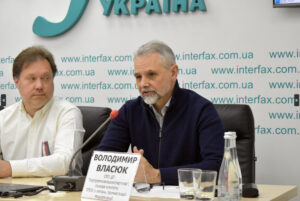
The share of imported construction materials in the Ukrainian market increased from 14% in 2021 to 23% in 2023, and the domestic construction materials market needs systematic support from the state.
This opinion was expressed by Volodymyr Vlasiuk, CEO of Ukrpromvneshexpertiza, Chairman of the CCIU Committee on Industrial Modernization, during the round table “Building Materials. Preparedness for Market Needs for Recovery” held at the Interfax-Ukraine news agency on Tuesday.
“The share of imports in covering domestic consumption has increased from 14% in 202 to 23% in 2023. Thus, even the funds that go through the public procurement procedure can be largely used for imports. More research is needed on individual materials, but the upward trend in the use of imported materials in a developed industry is generally negative for the economy,” Vlasiuk said.
He said that the second study of the construction materials market and its ability to meet the country’s needs since the beginning of the war is currently underway.
“The situation is changing dynamically. But there are still no glass production plants, as before. There are several (investment) projects, but they are not yet operational. As for such commodities as PVC, production has resumed and capacities have increased. New capacities are being built in the cement industry. But electrical equipment is still not available, as it was before the war. This is still a field for investment projects that should be stimulated by the state,” Vlasiuk said.
The expert highlighted key issues that businesses will not be able to solve without government involvement.
“In terms of stimulating demand, the role of the state is huge, as it increases procurement (for defense and recovery projects). It is extremely important that these funds are not spent on imported materials. We understand the extraordinary conditions in which Ukraine exists, we are at war. Therefore, in accordance with international law, we can apply, for example, Article 21 of the WTO, which allows a country to temporarily suspend its obligations assumed when joining the WTO,” Vlasiuk said.
He emphasized the need to focus on localization, purchasing materials (for budgetary or donor funds) only if at least some of them are produced in Ukraine.
The issue of booking specialists is also important. “It is necessary to find a balance between the needs of the economy and the frontline. Both areas are necessary for the country’s sustainability,” he said.
Another key task is to provide autonomous energy supply. “Obviously, it is necessary to move to a model of autonomous energy supply, for example, from alternative sources, primarily solar power plants. The state, together with partners, should offer good, cost-effective tools, as this requires a significant amount of funds,” Vlasiuk said.
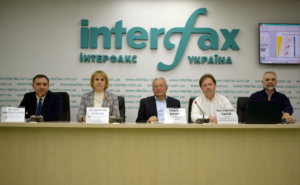
Cement consumption in the domestic Ukrainian market in 2023, which increased by 17% compared to 2022 and reached 5.4 million tons, will continue to grow moderately, according to Pavlo Kachur, chairman of the Ukrcement Association.
“Even in a state of war, we have undergone some adaptation. If 2022 was a shock year, and our cement consumption dropped to 4.6 million tons of cement per year against 10.5 million tons the previous year, in 2023 we adapted to the situation and reached 5.4 million tons. I think this is a good growth for wartime. I don’t think there will be such a jump in 2024, but we will probably reach 6 million tons of domestic cement consumption,” Kachur said at the roundtable discussion “Building Materials. Preparedness for Market Needs for Recovery” at Interfax-Ukraine on Tuesday.
In addition, at the end of 2023, exports amounted to 1.24 million tons of cement, while imports amounted to 23 thousand tons of special cements that are not produced in the country.
According to Kachur, the potential for cement production by enterprises in Ukraine today is 13.6 million tons of cement, while current financial and human resources provide for consumption of 12.5 million tons. Despite the ability of Ukrainian companies to fully cover the market’s needs, it makes sense to plan to expand production, he said.
“We are also preparing for other options. Processes may overlap, and one of them may be the negotiation process with the European Union. If it is successful, European infrastructure projects may also take place during the recovery period. This may lead to increased cement consumption, and we must be prepared for this,” said the head of Ukrcement.
The expert noted that production could be increased in three stages: the construction of new clinker kilns and capacity expansion, the restoration of plants in Balakliya and Kramatorsk, and the construction of new cement plants. The two companies are already considering the construction of two new clinker kilns, which will increase their cement production capacity by 2.4 million tons, but the construction will be launched after they reach the consumption level of 10.5 million tons of cement.
Kachur also emphasized the importance of localizing production in the recovery prospects and protecting the Ukrainian market.
“I support the thesis of maximum localization. This is the only way for Ukraine’s economy to develop. But it is also important to protect our market. We realize that the countries that are donors of funds for the recovery can also supply construction materials. However, I believe that we should have a separate policy for countries that are not on the side of supporting Ukraine today, during the war. We need to think about how to treat them if, after the war, they want to participate in the reconstruction with their materials. I think it would be unfair if they get the opportunity to make money on the Ukrainian market,” he said.
The Ukrcement Association was established in January 2004 through the reorganization of the Ukrainian Concern of Cement Industry Enterprises and Organizations Ukrcement.

State enterprise “NAEK Energoatom” on April 16 reported that IC “Mega-Policy” was recognized as the winner of the tender for insurance of liability for high-risk facilities, for damage that may be caused as a result of emergencies.
As reported in the system of electronic public procurement Prozorro, the expected cost -139,515 thousand UAH, the company’s price offer of 79,520 thousand UAH.
IC “Industrial Insurance Company” also took part in the tender with the offer of UAH 41,7 thousand.
As it was informed, IC Mega-Policy was registered in 2000, specializing in risk insurance.

Ukraine is creating the most favorable investment climate possible to encourage potential investors, said Taras Melnychuk, the representative of the Cabinet of Ministers in the Verkhovna Rada.
“Today we have met with representatives of some of the largest American companies willing to invest in Ukraine or already doing business here. In turn, Ukraine is creating the most favorable investment climate to encourage potential investors,” he wrote on his Telegram channel.
Melnychuk noted that the Ukrainian economy needs to attract American investment to recover and grow.
According to him, special attention is paid to developing cooperation with American arms and ammunition manufacturers.
“The main prerequisite for this is to provide Ukraine with additional air defense systems. This will help protect our entire civilian infrastructure from Russian terrorism,” the Cabinet representative emphasized.
In addition, Ukraine is also interested in developing logistics routes and the energy sector.
As previously reported, Prime Minister of Ukraine Denys Shmyhal and U.S. Special Representative for Ukraine’s Economic Recovery Penny Pritzker met with American businesses.